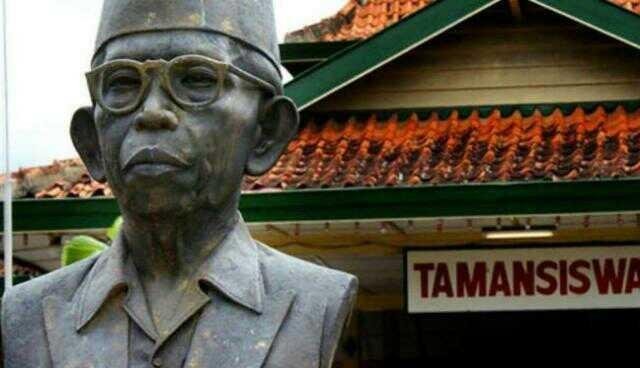Ki Hajar Dewantara, National Unifier that Always Reminiscent during Hardiknas
Every 2 May we will be reminded of the work of Ki Hajar Dewantara. He was the leader and pioneer of education during the Indonesian movement against the Dutch colonialists.
Ki Hajar Dewantara's activities and activities in establishing and developing Taman Siswa school began in 1922. Then became the focal point of National Education Day or Hardiknas every May 2nd.
He is also famous for the motto Tut Wuri Handayani whose original text read "Ing ngarsa sung tulada, ing madya mangun karsa, tut wuri handayani". The meaning of this motto is tut wuri handayani (from behind a teacher must be able to provide encouragement and direction). Then ing madya mangun karsa (in the middle or among students, the teacher must create the initiative and idea). Ing ngarsa sung tulada (up front, an educator should set an example or a good example of action).
Ki Hajar Dewantara Born in Yogyakarta on May 2, 1889. Born under the name Raden Mas Soewardi Soeryaningrat. He comes from the family environment of Sultan Palace. Raden Mas Soewardi Soeryaningrat. When the age of 40 years according to the calculation of Caka Year, renamed Ki Hadjar Dewantara.
From that moment on, he no longer uses the knighthood in his name. This is so that he can be free to close the people, both physically and his heart.
The journey of his life is truly colored by struggle and dedication for the benefit of his nation. He graduated from elementary school in ELS (Dutch elementary school). Then I went to STOVIA (Bumiputera Doctor's School), but I did not finish my illness.
He works as a journalist in several newspapers, including Sedyotomo, Midden Java, De Express, Oetoesan Indies, Kaoem Moeda, Tjahaja Timoer and Poesara. In his time, he was a reliable writer. His writings are very communicative, sharp and patriotic so as to raise the spirit of antikolonial for readers.
Actively organize
In addition to being tenacious as a young journalist, he is also active in social and political organizations. In 1908, he was active in Boedi Oetomo's propaganda section to socialize and inspire awareness of Indonesian society at that time. Especially about the importance of unity and unity in nation and state.
Then, with Douwes Dekker (Dr. Danudirdja Setyabudhi) and dr. Cipto Mangoenkoesoemo, he founded Indische Partij. The first political party that beraliran nationalism Indonesia was established on December 25, 1912 with the aim of achieving an independent Indonesia.
They attempted to register this organization to obtain the legal status of the Dutch colonial government. However, the Dutch colonial government through Idenburg Governor-General tried to block the presence of this party. The governor rejected the registration on March 11, 1913. The reason for his refusal was that the organization was supposed to awaken a sense of nationalism and move unity against the Dutch colonial government.
After independence, Ki Hajar Dewantara served as the first Minister of Education, Teaching and Culture. The name Ki Hadjar Dewantara is not only immortalized as a prominent figure and educational hero (Father of National Education) whose birth date 2 May became National Education Day, but also designated as National Movement Hero through Presidential Decree No.305 of 1959, November 28, 1959. Another award he received was Doctor Honoris Causa from Gadjah Mada University in 1957.
Two years after receiving the title of Doctor Honoris Causa, he passed away on April 28, 1959 in Yogyakarta and was buried there. Ki Hajar Dewantara's struggle and step should be an inspiration for young people today.
